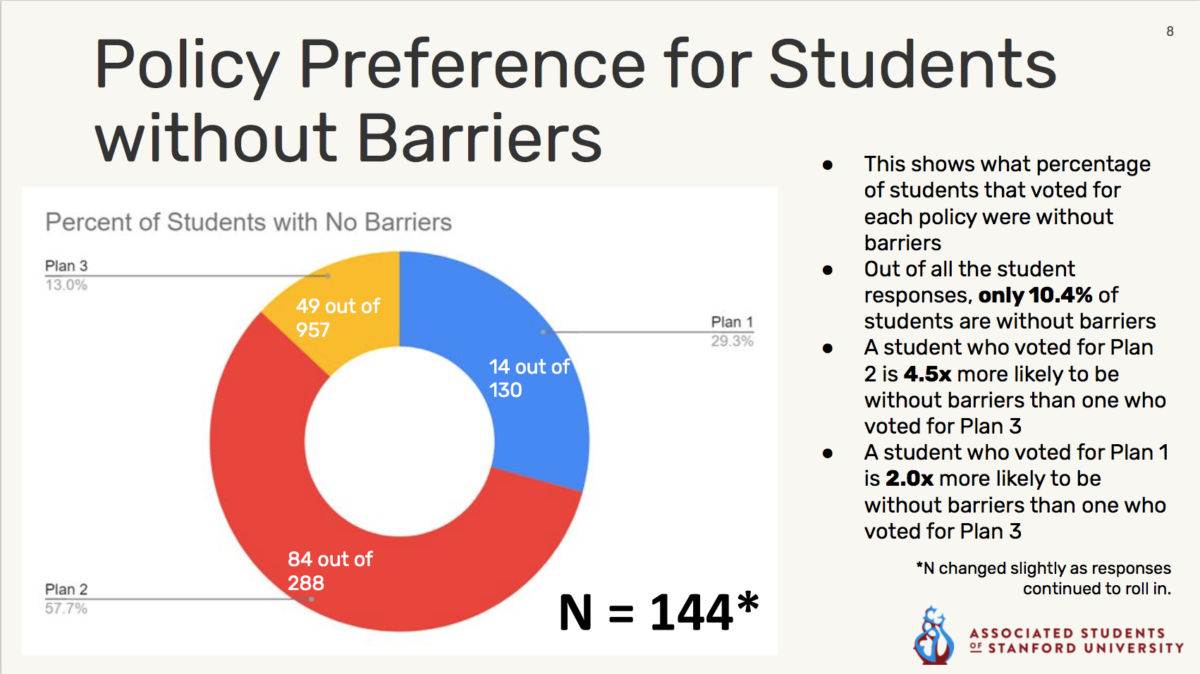The Faculty Senate voted 36-15 today to mandate that all spring quarter courses be graded on a satisfactory/no-credit (S/NC) basis, with the exception of courses in the graduate schools of business, law and the MD program in the school of medicine. The new grading system is meant to prioritize academic equity amid the widespread disruption caused by the COVID-19 pandemic, yet some argue that it does so at the cost of student agency.
Students who receive a C- or better in a spring class will have their grade recorded as S, and students who receive less than a C- will receive NC. The Senate also unanimously approved a policy change that “strongly urges that deans, departments, and programs exclude units of credit earned for a ‘CR’ [credit] or ‘S’ grade during Spring quarter 2019-20 from program unit maximums and/or alter program requirements as appropriate.”
“Courses taken during Winter and Spring quarter 2019-20 as CR/NC [or S/NC] … may be eligible to fulfill General Education requirements pending review by the [different course programs’ respective governing bodies] … in manners and with timelines that these groups decide,” reads another unanimously approved change in policy.
The Breadth Governance Board has already approved allowing Ways-certified courses taken for S/NC to count towards the Ways requirement, according to Board Chair Lynn Hildemann, and is currently working with the Registrar’s office to implement this change for the coming quarter.
The new grading scale will also apply to all non-MD courses in the graduate school of medicine, affecting masters and Ph.D. students, according to Associate Dean for Graduate and Career Education & Diversity Ayodele Thomas.
In approving the change to mandatory S/NC grading, Stanford joins peer institutions like Columbia and Dartmouth, who have implemented a credit/no-credit basis for their classes without allowing students the opportunity to opt out and receive a letter grade.
However, the policy approved by the Faculty Senate, the first of three proposed options, was favored by less than 9% of respondents to a survey circulated Wednesday night and Thursday morning among the student body by Associated Students of Stanford University (ASSU) leadership.
The second option, which allowed students to choose either a CR/NC or letter grading scale, and the third option, in which all passing grades would be recorded as an A, were rejected by 16-32 and 5-42 votes, respectively.
The three options were voted on in numerical order, and votes were held for options 2 and 3 even after the first option received a majority vote.
The nearly four-hour meeting — the first in the Senate’s 52-year history to be conducted virtually, in which members voted by clicking a button to “raise their hands” over Zoom — left some attendees feeling confused and frustrated.

Political science department chair Judith Goldstein argued that the structure of the meeting had skewed voting so that option 1, by virtue of being put to a vote first, received preference over the other two.
“The ordering of these and the conversations about these has created a bias, and in fact for everyone today talking about equal opportunity and equity, I think there’s been a bias in this discussion, in which we should think ourselves, and think about how we do things,” Goldstein said during discussion about the proposed options.
She also cautioned meeting leaders against “weaponizing” procedural rules, which she felt were used to “[shut] us up before we’re ready to stop talking.”
In response to Goldstein’s critique, biology professor and Senate Chair Tim Stearns said the measure to vote on each option “passed by a wide margin.”
“We’ve tried to make this as fair as possible,” he added.
ASSU executives Erica Scott ’20 and Isaiah Drummond ’20 spoke during the meeting to advocate for an A+/A/NC option. A similar option — Universal A/NC — was the overwhelming favorite of the survey respondents, roughly 65% of whom ranked it as their first choice. The A+/A/NC option, modified after student feedback on the survey, was endorsed by the Undergraduate Senate in an 11-0 vote over Slack on Thursday morning, with 3 of 14 senators not voting by the 12 p.m. PT deadline.
Roughly 25% of survey respondents’ first choice was option 2, which would allow students to opt for a letter grade or CR/NC grading scale.
In light of the unprecedented nature of spring quarter, Scott said that Stanford students were managing two major concerns: ensuring a fair grading system, while also having the opportunity to achieve grades that could be crucial for future opportunities.
“Based on those considerations, it’s our opinion that the first policy, universal satisfactory/no credit, is equitable, but it does deny students a chance to earn a letter grade which can be very, very important for certain subsets of students,” she said, emphasizing those applying for postgraduate academic opportunities.
ASSU leadership felt that the third option, A+/A/NC, did the most to balance students’ competing interests for their future prospects while ensuring academic equity during the pandemic.
Drummond also noted the difference in response between students for whom online learning presented significant barriers and those who faced none. According to survey data, 57% of students who face no barriers — which range from limited access to adequate wifi, immunocompromised family members or heightened financial insecurity — voted for option 2.

“What we can draw from this generally is that those that are in a more privileged position and don’t have to deal with the effects of COVID-19 are advocating for something that allows them to raise their GPA at the expense of others, in a way that may not be equitable,” Drummond said.
However, several faculty members expressed their aversion to the ASSU’s proposal, especially on the question of giving A grades to work that otherwise would have received a C-. Other faculty raised concerns that students would take advantage of the grading system to intentionally take more difficult classes, giving them an unjust advantage over students who took those classes in previous terms.
Many attendees argued that the unpredictable, tumultuous nature of life during the pandemic ultimately required a commitment to equity above all else.
“Agency in a time of chaos is not agency,” said math professor Ravi Vakil, voicing his support for the first and ultimately approved option.
Faculty senators also voted to approve a bevy of amendments to academic policies, all meant to mitigate consequences of the University moving to online learning for the entire spring quarter.
The approved policies include exempting classes taken this spring from transfer credit limits and making spring classes exempt from the 36-unit maximum for CR/NC classes. Other changes relax the deadline for submitting leave-of-absence requests and allow current second-year Ph.D. students who have not been admitted to candidacy to defer their qualifying procedures to the fall quarter.
This article has been updated to include relevant information regarding Ways requirements and non-MD courses in the medical school.
Contact Grace Carroll at gac23 ‘at’ stanford.edu.
